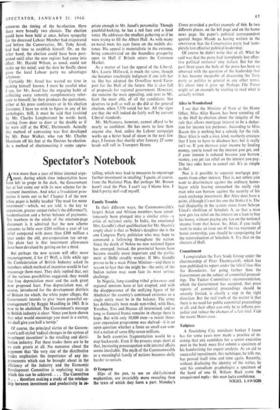Family Trouble In their different ways, the Commonwealth's largest Asian
and African members have simul- taneously been plunged into a similar crisis—a crisis of national unity. In India, the emotional Mrs. Gandhi's chief qualification for Mr. Shastri's empty chair is that as Nehru's daughter she is the one Congress Party politician who may hope to command a following throughout the nation. Since the death of Nehru no new national figure has emerged; instead, the provincial bosses have become steadily more important and the parlia- ment at Delhi steadily weaker. If Mrs. Gandhi proves to be a weak Prime Minister—and there is reason to fear that she might be—the unity of the Indian nation may soon face its most serious challenge.
In Nigeria, long-standing tribal grievances and regional tensions have at last erupted, and with the disappearance of the unifying figure of Sir Abubakar the country's continued existence as a single entity must be in the balance. The army has deliberately been made non-tribal, with Ibos, Yorubas, Tivs and Hausas all intermixed, and so long as General Ironsi remains in charge there is hope. But with only 10,000 men—a recent three- year expansion programme was shelved—it is an open question whether a force so small can con- trol a nation of some fifty-seven millions.
In both countries fragmentation would be a step backwards. Even if the process stops short at that, increasing preoccupation with internal affairs seems inevitable. The myth of the Commonwealth as a meaningful family of nations becomes daily harder to sustain.


































 Previous page
Previous page